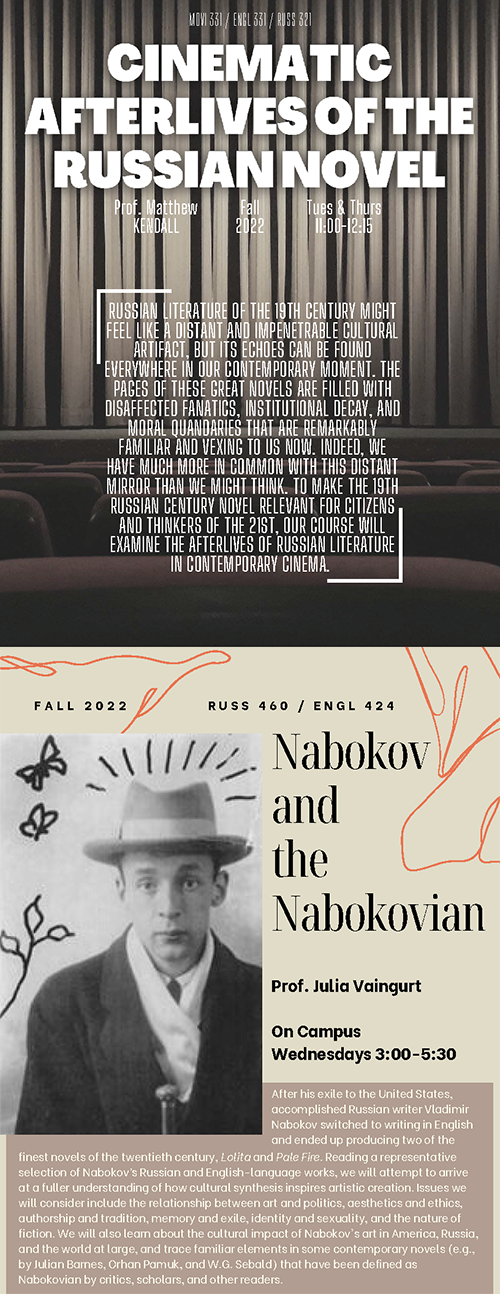Fall 2022 Russian Course Descriptions
This is an unofficial list of courses that will be offered in Russian Studies in Fall 2022. It is strictly for the use of expanded course descriptions. For the complete official course offerings, please consult the My.UIC portal.
For a list of all courses and general course descriptions, please see the UIC Academic Catalog.
Fall 2022 Courses in Russian Language Heading link
All classes will meet Mondays and Friday on campus and Friday online synchronously. Additionally additional online asynchronous work is required for the 4th credit hour of the 100-level classes.
RUSS 101 – Elementary Russian I
- MWF 9:00-9:50
- MWF 1:00-1:50
RUSS 103 – Intermediate Russian I
- MWF 10:00-10:50
- MWF 1:00-1:50
RUSS 203 – Advanced Russian through Short Stories
- MWF 12:00-12:50
Fall 2022 Russian Studies Courses in English Heading link

RUSS 115 – Russian Culture Before the Revolution
On Campus, TR 2:00-3:15
Instructor: Dr. Matthew Kendall
World Cultures
RUSS 120 – The Russian Short Story in Translation
On Campus, MWF 2:00-2:50
In this course we will analyze a wide array of short stories by some of the most important writers of the nineteenth and twentieth centuries. The course is intended both as an introduction to Russian literature and culture and, more generally, as an introduction to literary analysis as a powerful form of critical thinking. Emphasis will be placed on examining the evolving aesthetics of the short story in relation to the dynamics of Russian cultural history.
Creative Arts; World Cultures
RUSS 241 – Desire, Death, and Dostoevsky
On Campus, MWF 11:00-11:50
Instructor: Dr. Julia Vaingurt
The course will trace the creative evolution of Fyodor Dostoevsky from his earliest works to his great murder novels. We will examine Dostoevsky’s inquiry into the themes of love and death, sin and salvation, guilt and shame, freedom and compulsion, individual will and moral responsibility. Dostoevsky’s rendering of these timeless questions inspired countless writers and artists, philosophers and psychologists. To uncover the secret of Dostoevsky’s enduring appeal to various audiences both home and abroad, we will look into how Dostoevsky’s works have been received and interpreted in various intellectual traditions and contexts.
Creative Arts
RUSS 321 / MOVI 331 / ENGL 331 – Cinematic Afterlives of the Russian Novel
On Campus, TR 11:00-12:15
Instructor: Dr. Matthew Kendall
Russian literature of the 19th century might feel like a distant and impenetrable cultural artifact, but its echoes can be found everywhere in our contemporary moment. The pages of these great novels are filled with disaffected fanatics, institutional decay, and moral quandaries that are remarkably familiar and vexing to us now. Indeed, we have much more in common with this distant mirror than we might think. To make the 19th Russian century novel relevant for citizens and thinkers of the 21st, our course will examine the afterlives of Russian literature in contemporary cinema. In addition to learning the history and development of the Russian novel (as well as how to read these texts), we will discuss and contrast how these works continue to influence stories and ideas that remain popular and influential in world cinema. In doing so, we will strengthen our skills of textual and cinematic analysis by paying close attention to the concepts of adaptation, medium specificity, and intertextuality.
course flyer
RUSS 460 / ENGL 424 – Nabokov and the Nabokovian
On Campus, W 3:00-5:30
Instructor: Dr. Julia Vaingurt
After his exile to the United States, accomplished Russian writer Vladimir Nabokov switched to writing in English and ended up producing two of the finest novels of the twentieth century, Lolita and Pale Fire. Reading a representative selection of Nabokov’s Russian and English-language works, we will attempt to arrive at a fuller understanding of how cultural synthesis inspires artistic creation. Issues we will consider include the relationship between art and politics, aesthetics and ethics, authorship and tradition, memory and exile, identity and sexuality, and the nature of fiction. We will also learn about the cultural impact of Nabokov’s art in America, Russia, and the world at large, and trace familiar elements in some contemporary novels (e.g., by Julian Barnes, Orhan Pamuk, and W.G. Sebald) that have been defined as Nabokovian by critics, scholars, and other readers.
course flyer